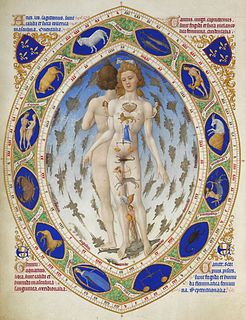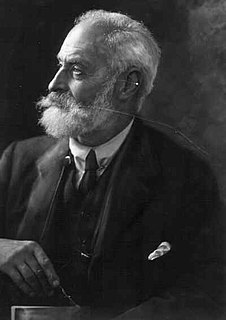
War and Peace is a literary work mixed with chapters on history and philosophy by the Russian author Leo Tolstoy, first published serially, then published in its entirety in 1869. It is regarded as one of Tolstoy's finest literary achievements and remains an internationally praised classic of world literature.

Anna Karenina is a novel by the Russian author Leo Tolstoy, first published in book form in 1878. Many writers consider it the greatest work of literature ever written, and Tolstoy himself called it his first true novel. It was initially released in serial installments from 1873 to 1877 in the periodical The Russian Messenger.

Christian anarchism is a Christian movement in political theology that claims anarchism is inherent in Christianity and the Gospels. It is grounded in the belief that there is only one source of authority to which Christians are ultimately answerable—the authority of God as embodied in the teachings of Jesus. It therefore rejects the idea that human governments have ultimate authority over human societies. Christian anarchists denounce the state, believing it is violent, deceitful and, when glorified, idolatrous.

Medieval medicine in Western Europe was composed of a mixture of pseudoscientific ideas from antiquity. In the Early Middle Ages, following the fall of the Western Roman Empire, standard medical knowledge was based chiefly upon surviving Greek and Roman texts, preserved in monasteries and elsewhere. Medieval medicine is widely misunderstood, thought of as a uniform attitude composed of placing hopes in the church and God to heal all sicknesses, while sickness itself exists as a product of destiny, sin, and astral influences as physical causes. On the other hand, medieval medicine, especially in the second half of the medieval period, became a formal body of theoretical knowledge and was institutionalized in the universities. Medieval medicine attributed illnesses, and disease, not to sinful behaviour, but to natural causes, and sin was only connected to illness in a more general sense of the view that disease manifested in humanity as a result of its fallen state from God. Medieval medicine also recognized that illnesses spread from person to person, that certain lifestyles may cause ill health, and some people have a greater predisposition towards bad health than others.
What is Art? is a book by Leo Tolstoy. It was completed in Russian in 1897 but first published in English due to difficulties with the Russian censors.

"Ivan the Fool" is an 1886 short story by Leo Tolstoy, published in 1886. The name "Ivan the Fool" hints to a popular hero of Russian folklore.

The Death of Ivan Ilyich, first published in 1886, is a novella by Leo Tolstoy, considered one of the masterpieces of his late fiction, written shortly after his religious conversion of the late 1870s.

Aylmer Maude and Louise Maude (1855–1939) were English translators of Leo Tolstoy's works, and Aylmer Maude also wrote his friend Tolstoy's biography, The Life of Tolstoy. After living many years in Russia the Maudes spent the rest of their life in England translating Tolstoy's writing and promoting public interest in his work. Aylmer Maude was also involved in a number of early 20th century progressive and idealistic causes.

"The Three Questions" is a short story by Russian author Leo Tolstoy first published in 1885 as part of the collection What Men Live By, and Other Tales. The story takes the form of a parable, and it concerns a king who wants to find the answers to what he considers the three most important questions in life.
Promoting a Devil is a short story by Russian author Leo Tolstoy first published in 1886.. It is a cautionary tale story about a man who fell into a sinful life when he was given more than he needed.
"Repentance" is a short story by Russian author Leo Tolstoy first published in 1886. The story details the difficulties of a repentant sinner's attempts to enter Heaven.
"The Grain" or "A Grain As Big As A Hen's Egg" is an 1886 short story by Leo Tolstoy about a king seeking to understand the properties of a grain he acquires.

"Where Love Is, God Is" is a short story by Russian author Leo Tolstoy. The title references the Catholic hymn Ubi Caritas. One English translation of this short story as translated by Nathan Haskell Dole uses the alternate title translation of "Where Love Is, There God Is Also". It was published in the United States under Crowell Company's "Worth While Booklet" Series. It was written in 1885.

Count Lev Nikolayevich Tolstoy, usually referred to in English as Leo Tolstoy, was a Russian writer who is regarded as one of the greatest authors of all time. He received nominations for the Nobel Prize in Literature every year from 1902 to 1906 and for the Nobel Peace Prize in 1901, 1902, and 1909. That he never won is a major controversy.
"The Three Hermits" is a short story by Russian author Leo Tolstoy written in 1885 and first published in 1886 in the weekly periodical Niva (нива). It appeared in the short-story collection Twenty-Three Tales which was first translated into English for an edition released by Funk & Wagnalls in 1907. The title refers to its three central characters; unnamed simple monks living on a remote island in a life of prayer and contemplation "for the salvation of their souls."

The Gospel in Brief is a 1902 synthesis of the four gospels of the New Testament into one narrative of the life of Jesus by Russian author Leo Tolstoy.
"Evil Allures, But Good Endures" is a short story by Leo Tolstoy written in 1885. It is commonly included in the massively-reproduced collection Twenty-three Tales.
"The Young Tsar" is a short story by Leo Tolstoy written in 1894. According to Tolstoy's diary, he recalled having titled it "The Dream of a Young Tsar". The introduction that prefaces the story is by Aylmer Maude.
"The Godson" is a short story by Leo Tolstoy published in 1886. Inessa Medzhibovskaya, professor of English at New School for Social Research, describes it as the tale of a godson who is forbidden to open a certain sealed room in his godfather's palace, but then opens it and is banished, leading to his need for redemption.
"Twenty-Three Tales" is a popular compilation of short stories by Leo Tolstoy. According to its publisher, Oxford University Press, the collection is about contemporary classes in Russia during Tolstoy's time, written in a brief, morality-tale style. It was translated to English by Louise Maude and Aylmer Maude










